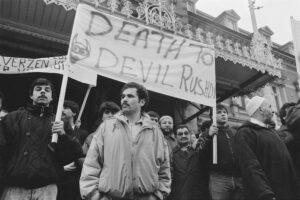Imagine if Palestinian and Israeli kids took over the peace process
The future would look very different if we put the peace process in the hands of Palestinian and Israeli children.
A couple of months ago, as Israelis celebrated 60 years of statehood and Palestinians marked six decades of dispossession, I wondered whether there would ever be peace between the two peoples.
Rather than dwell on the depressing present or venture into the minefield of the past, I decided to look forward in time, to a fictional future where peace prevailed.
Commenting on my article, Hitham Kayali of OneVoice, a grassroots movement which has gained the written support of 600,000 Palestinians and Israelis for a two-state solution said: “Only [by using their imagination] will people understand why compromises should be made.”
I was pleased to learn from Kayali that Israeli and Palestinian schoolchildren have been involved in a similar experiment: using their imagination to dream of what life could be like, 10 years from now, in a peaceful 2018.
I was intrigued to get some insight into the thinking of the coming generation, whose voices we rarely get to hear, despite the fact that they stand to lose the most from this ongoing conflict.
Besides, I have this (perhaps misguided?) sense that children are often more sensible than us adults. At least, they don't seem to bear a grudge for long – and that is a precious asset in the promised land, where grudges take on a life of their own and can last for generations.
“These children have never experienced peace. They don't have the chance to travel to other countries to see how it is. This is all from their imagination,” Kayali points out.
One Israeli kid from Sderot, which borders Gaza and is on the receiving end of Qassam rocket attacks, imagined that he single-handedly laid the ground for peace! “It all started by accident,” he wrote.
He loaded the radio-controlled plane he got for his birthday with sweets. His inexperienced hand soon lost control of the aircraft and it dawned on him that it was on course to become another casualty of war. In a panic, he pressed the wrong button and inadvertently bombed – or, more accurately, bon-bonned – Gaza with his payload of sweets.
The Israeli army couldn't figure out what had happened … everybody was hugging them and they dropped their weapons at once. I almost started to cry. All I wanted was to get my model plane back … but then I realised that I'd actually brought peace to Israel.
Gaza also features in the vision of a Palestinian boy, who studies at a school for the visually impaired in Ramallah. He starts his essay by describing his reaction to the constant barrage of bad news coming out of the Strip: “My little heart was tormented with pain, for those [images] could cause rocks to cry.”
Drained, he snoozes in front of the TV and is awakened in a peaceable country by the sounds of “chirping birds” instead of “bullets and cannons”. In his dream, the simple joy of mobility features strongly. He describes getting to school on time because there are no more military checkpoints, passing his uncle who is “happily ploughing his field”. He is accompanied by his father because “there isn't a prison that can deprive me of him, because prisons have been demolished and converted into parks for children”.
The boy's dream may strike an outsider as being quite humble and unremarkable. But for most of his short life, Palestinians have been living the reality of Israeli closures, where going even to a neighbouring village is often impossible.
A Palestinian girl from Tulkarem also dreams of the freedom to roam. In her essay, she flits freely between Jerusalem, Amman, Ramallah, Jericho and the ultimate symbol of mobility, an international airport in Qalandia. Back in 2008, this same West Bank village, which hosted a six-decade-old refugee camp, was “filled with havoc, weeds, and piles of rubble, barbed wire and soldiers with helmets”.
In her dreamscape, the newly independent Palestine is a dynamic, multicultural, multiethnic land, popular with tourists. The cities have impressive skylines. She describes forests on the slopes of mountains and how “Palestinian villages fall asleep in the dreamy, green embrace of nature”, where there are “no military jeeps on the road and no settlements” on the hilltops.
So, what is to happen to the Israeli army?
This is the subject of another essay by an Israeli boy. Dean, a young Israeli soldier, has been called up for some mysterious mission. His unit informs him that the elusive Hassan el-Hamid has been located.
You get the feeling that something is amiss when they pick up a UN representative and that el-Hamid is perhaps not a fugitive. It turns out that he is actually their commander and he's leading them on a peacekeeping mission to Iraq. El-Hamid explains that the Israeli army has been renamed the Israeli peace defence force and that “many countries need our assistance in resolving conflicts and deep-rooted disputes and restoring peace”.
This is not only a commendable dream but reflects a powerful desire among many Israelis to be fully accepted as valuable members of the Middle Eastern and international community.
“The essays which the Palestinian and Israeli children have written are in fact one of the best indicators or opinion polls of what the situation really is like,” Kayali says.
I would go even further and publicly urge the adults to let the children take over the peace process and bring to it the sensibility and competence of childhood.
_______
This article first appeared in The Guardian on 31 July 2008.


